A study in motivation, part 2: Self-assessing abilities
Last spring, we surveyed our 8th, 10th, and 11th grade students about 1) their outlook or motivation for continuing or not continuing to learn Spanish and 2) what they thought they could do in Spanish. After the motivation questions, students were given a list of “I Can” statements related to communicative functions in Spanish. Options to circle were:
- most of the time (blue)
- sometimes (red)
- not really (green)
And some students did not understand the directions and gave no response on some answers (I assume on the ones they did not think they could do, but I only analyzed them as a ‘no response’ [purple]).
Aside from the obvious, which is I wanted to let my Spanish 1 teacher know what the 8th graders thought were their strengths and weaknesses, I also wanted to know if a negative attitude toward Spanish affected whether or not students thought they could do anything with the language. Or, conversely, does a lack of perceived ability make a student less likely to feel positive about Spanish class?
Our sample size was 42. We had 12 students answer yes, they were looking forward to Spanish, and 30 answer no, they were not.
Students with a negative attitude were less likely to think they can consistently use numbers in context.
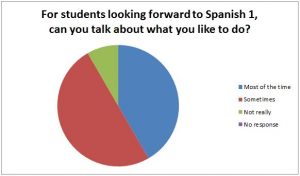
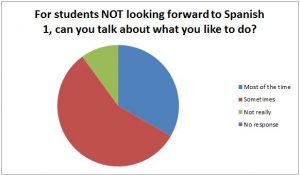 Negative or positive attitude did not significantly affect whether or not students thought they could talk about what they like to do. Most thought they could do this sometimes.
Negative or positive attitude did not significantly affect whether or not students thought they could talk about what they like to do. Most thought they could do this sometimes.
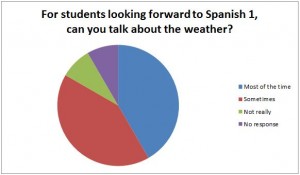
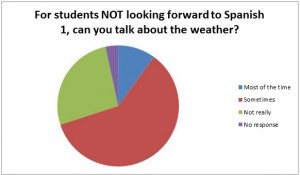 Students with a positive attitude thought that they were better at talking about the weather than students with a negative attitude. The majority of positive students thought they could talk about the weather most of the time or sometimes. Most negative students thought they could sometimes or not really.
Students with a positive attitude thought that they were better at talking about the weather than students with a negative attitude. The majority of positive students thought they could talk about the weather most of the time or sometimes. Most negative students thought they could sometimes or not really.
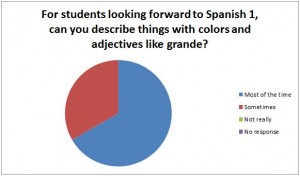
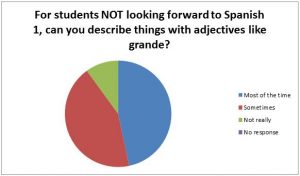 Most students on both sides thought they could describe things with adjectives like grande. Only some students with a negative outlook answered this question not really. I think this question was poorly worded – when I do the survey again this year, I will not use the adjective grande. I think students were more likely to think more highly about their ability here because grande is such an easy adjective. The response is significantly less positive on the later question about describing people, but students failed to realize it’s essentially the same function.
Most students on both sides thought they could describe things with adjectives like grande. Only some students with a negative outlook answered this question not really. I think this question was poorly worded – when I do the survey again this year, I will not use the adjective grande. I think students were more likely to think more highly about their ability here because grande is such an easy adjective. The response is significantly less positive on the later question about describing people, but students failed to realize it’s essentially the same function.
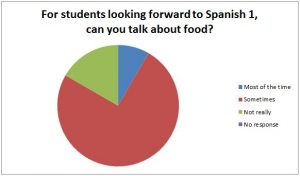
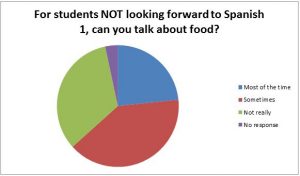 Students with a positive outlook were far more likely to think they could talk about food.
Students with a positive outlook were far more likely to think they could talk about food.
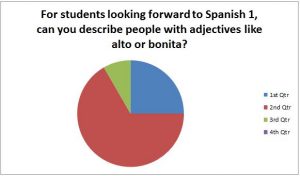
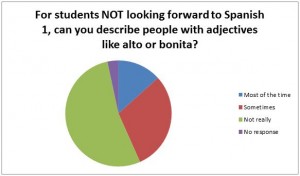 As I mentioned before, students were more likely to think they could describe things than people, although I think this is due to my choice of adjectives. I would guess students answered this question based on whether they knew the meanings of alto and bonita. The difference in response here is one of the most striking. The majority of students with a negative outlook answered that they could not really describe people. An even greater majority of students with a positive outlook answered that they could describe people sometimes.
As I mentioned before, students were more likely to think they could describe things than people, although I think this is due to my choice of adjectives. I would guess students answered this question based on whether they knew the meanings of alto and bonita. The difference in response here is one of the most striking. The majority of students with a negative outlook answered that they could not really describe people. An even greater majority of students with a positive outlook answered that they could describe people sometimes.
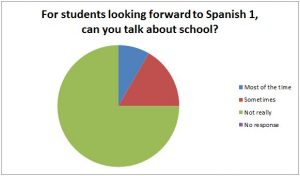
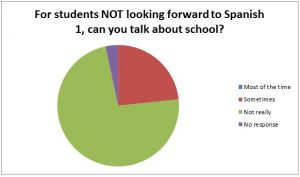 The answer to my question about school was very clear on both sides: these students have not learned to talk about school.
The answer to my question about school was very clear on both sides: these students have not learned to talk about school.
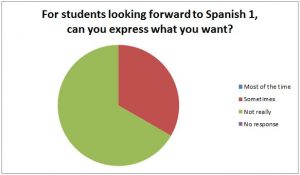
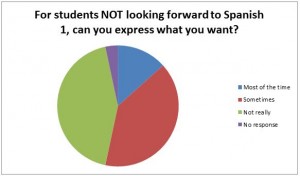 This result was very interesting; students with a positive outlook were more likely to think they could not talk about what they want. Only students with a negative attitude thought they could do this most of the time.
This result was very interesting; students with a positive outlook were more likely to think they could not talk about what they want. Only students with a negative attitude thought they could do this most of the time.
This is another question I think was poorly worded. I don’t know if students thought I meant that they could talk about whatever they want, rather than what I really meant: could they express their wants (using quiero, e.g.)?
My results bore out my hypothesis: aside from the last question about expressing wants, students who were not looking forward to Spanish 1 were less likely to think they could perform basic communicative functions in the language. I do not know what comes first – the perceived lack of ability or the negative attitude. But I know they are related.
For most of our 8th graders, this is after three years of instruction for an hour and a half per week. Something we’re doing isn’t working, and we have a lot of work to do.
2 Comments
Comments are closed.
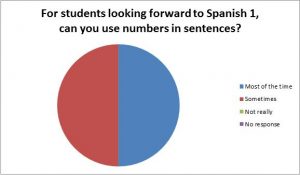
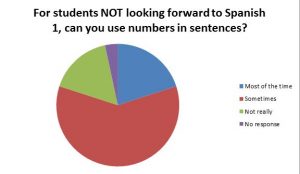




Question: do you use Linguafolio portfolios with your students, checking in regularly with them about their skills?
This is particularly useful right after they have successfully completed an assessment geared toward one or more of the communicative modes. I’m including the link to a wonderful website with the work of a group of teachers in Kentucky which includes Interpersonal Speaking, Presentational Speaking, Presentational Writing assessments that go along with the units they have chosen for levels 1, 2, 3 for FR, Germ and Span. This year, half of our language teachers are going to experiment with these units AND the assessments. Why? to further move towards communicative function/mode centered curriculum, teaching and student proficiencies.
https://skydrive.live.com/?cid=28f7c805d5a3213d&id=28F7C805D5A3213D!154
Hi Diane – no, we have not used Linguafolio yet, although I’m fairly familiar with it, mostly because I teach advanced classes which is not the place to roll it out. I talked to my former elementary teacher about starting it in 6th grade, and he seemed receptive but never tried it. Thanks for reminding me that I wanted to start this in 6th grade – I know our new teacher will be willing.
I actually live in Louisville, although I teach at a private school and not for Jefferson County Public Schools, where the teachers you’re talking about work. Many of them are friends of mine and I have done quite a bit of professional development with Thomas Sauer and his teachers (though he has moved to a nearby city now). You’re right, their units and assessments are great. I’ve adapted their rubric for my own use and design my assessments similarly but for my advanced students’ units. I’m also working with my Spanish 1/2 teacher to assess all three modes of communication consistently with communicative proficiency assessments. This kind of assessment is critical to developing proficiency! However, we have had no proficiency assessments in grades 2-8 because our previous teacher was not familiar with such a thing and was very resistant to professional development. Not so with our new teacher, so I’m hopeful for great changes!